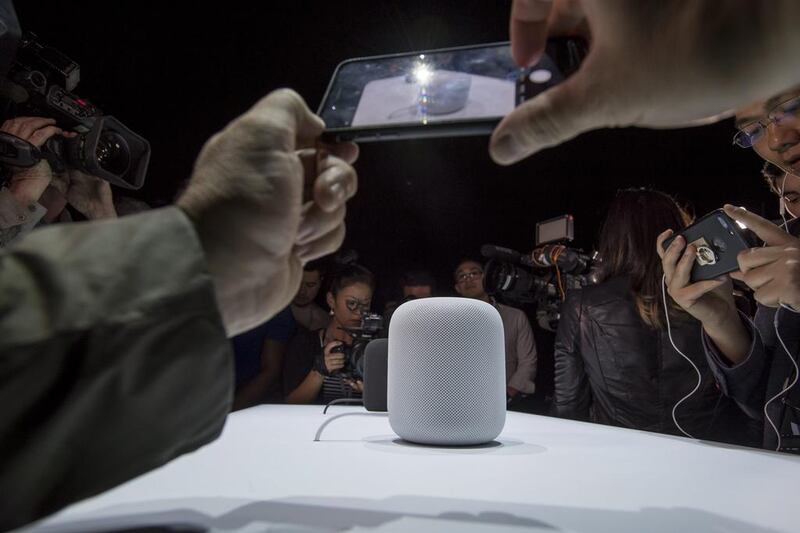It is good to see Apple finally getting into the smart speaker game against Google and Amazon with its upcoming HomePod.
It is just too bad the iPhone maker is focusing on the wrong part of the whole concept.
The HomePod, announced by Apple this week and set to go on sale in the United States, the United Kingdom and Australia in December at US$349, is designed to be a good-sounding music speaker, first and foremost.
It features a large woofer for deep bass and an array of seven tweeters for high-frequency sounds. It also packs software that can detect where the speaker is in a room and adjust its output accordingly, to deliver what Apple says is optimal sound in any situation.
On top of that, the HomePod has six built-in microphones so that it can hear users’ voice commands even when loud music is playing.
Put it all together and you have an impressive device that blows away the audio specs found on competing Google Home and Amazon Echo smart speakers.
That explains the big price difference. Google’s speaker sells for US$129 while the Echo retails for US$179. Amazon’s smaller Dot speakers go for just $49. As with most of its products, Apple is coming in at the premium end of the category.
But sound quality may be besides the point when it comes to smart speakers – the artificial intelligence software within them is the real selling point. And on that front, Apple is way behind.
A recent report by the digital agency Stone Temple found Apple’s Siri smart assistant – found in most of the company’s products – to be quite dumb. Siri was only able to answer 21 per cent of 5,000 everyday factual knowledge questions asked, and of those, it got only 62 per cent correct.
Google Assistant, in the search company’s speaker, did considerably better by answering 68 per cent of questions with 90 per cent accuracy. Microsoft’s Cortana came in second place, answering 56 per cent of questions with 81 per cent accuracy.
Apple’s saving grace is that Siri performed better than Amazon’s Alexa, found on the Echo, which managed to answer only 20 per cent of questions. Still, Alexa had a much higher accuracy rating – 87 per cent – than Apple’s assistant.
In her newly released annual Internet Trends report, the influential American venture capitalist Mary Meeker points out that voice input is one of the most important technology developments to watch this year. And on that front, Google is killing it.
Thanks to smart acquisitions and a continued focus on the field, the company’s voice input accuracy has improved 20 per cent over the past four years to 95 per cent. Google is approaching perfection while Siri is still working out the basics.
Apple is trying to hide this lag by showing off the HomePod’s music capabilities.
In demos at its World Wide Developers Conference in San Francisco on Monday, the company highlighted how users can ask the speaker to identify the song being played, or even the drummer in the respective band.
It is a clever way of putting Siri’s best foot forward while masking its deficiencies.
Apple is indeed moving to make up for its artificial intelligence lag with acquisitions, such as its recent $200 million purchase of the California-based Lattice Data, but it is an uphill struggle. Capabilities take years to build up and it will likely take latecomers even longer now that the battle for talent in the field has reached fever pitch.
In the meantime, the iPhone maker is hoping it can appeal to consumers by offering them premium hardware, as it does with phones, tablets and computers.
But there is no guarantee that approach will work this time – and there are plenty of reasons to believe it will not with the HomePod. Many consumers who can afford to buy Apple products probably already have decent-quality audio hardware at home, either in the form of proper stereo systems, Sonos speakers or TV sound bars.
The seven-inch-tall HomePod may be a better speaker than its Google and Amazon competitors, but it is questionable whether it will be able to supplant those higher-end devices.
Investors do not believe it will, with Apple shares dipping slightly on the Nasdaq stock market following Monday’s unveiling. Wall Street analysts are not enthused either. “Given the price point relative to competitive offerings, we would expect the near-term impact from HomePod to be immaterial,” Piper Jaffray’s Michael Olson wrote in a note to clients.
Hey Siri, how do we make you better – and fast?
Peter Nowak is a veteran technology writer and the author of Humans 3.0.
Winner of the Week: Alphabet
Google’s parent had its shares crack US$1,000 on the Nasdaq stock exchange on Monday, just six days after Amazon did the same. The stock is up 38 per cent since August, 2015, when Google became Alphabet.
Loser of the Week: Theresa May
The British prime minister has renewed her call to tightly control the internet following the terror attacks in London over the weekend. Free-speech advocates and tech companies alike have decried her comments as anti-democratic.
business@thenational.ae
Follow The National's Business section on Twitter





